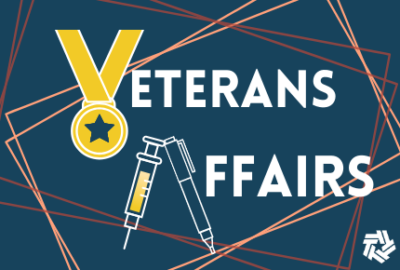
Hubbard Radio Washington DC, LLC. All rights reserved. This website is not intended for users located within the European Economic Area.
Hubbard Radio Washington DC, LLC. All rights reserved. This website is not intended for users located within the European Economic Area.
The Constitution gives Congress a lot of authority over the structure and operation of the military, even if the president is commander in chief. Zach Price arg...
Best listening experience is on Chrome, Firefox or Safari. Subscribe to Federal Drive’s daily audio interviews on Apple Podcasts or PodcastOne.
The Constitution gives Congress a lot of authority over the structure and operation of the military, even if the president is commander in chief. Zach Price, professor of law at the University of California Hastings Law school, argues that Congress ought to use that authority more than it does, which is very little. He joined Federal Drive with Tom Temin to discuss.
Interview transcript:
Tom Temin: Mr. Price. Good to have you one.
Zach Price: Thanks so much for having me. Delighted to be here.
Tom Temin: And I guess it would be fair to characterize you as an expert in constitutional and administrative law, correct?
Zach Price: I do the best I can that those are my main scholarly areas.
Tom Temin: Congress exercises, a lot of oversight and post-facto evaluation of the military. But not much in the way of this unit should do this and this service should do that. And you’re arguing in your lawfare article that maybe they should. Tell us more.
Zach Price: Sure. Well, I think, the President has a lot of power over foreign affairs and national security and military matters. But Congress has a lot of power too, and it does actually use it, at least in behind the scenes ways through its powers of appropriation and power to structure the military. And I think they should appreciate those powers and use them self consciously.
Tom Temin: Because every year there’s a national defense authorization bill, and it’s so big that your browser can’t even load it. I had that trouble. And there’s a lot of authority and management of the military there. Is that the primary way that they do it?
Zach Price: Yes, I mean, there’s the annual defense authorization act as well as appropriations bills every year. And they kind of blend together because often the authorization act, the limitations Congress puts in will be framed in terms of limiting what resources are available for what purposes. And I mean, that reflects that kind of structural feature of the modern federal government, which is presidents and executive officials have been delegated a lot of power, not just with respect to the military and foreign affairs, but domestic policy also. So they often can be the kind of first mover in policy, but Congress can then react in these annual appropriations laws that are generally time limited. So the administration has to come back every year for more money. And that’s often where Congress puts limitations or kind of constraints on executive policy.
Tom Temin: And you’re writing of two examples here that provision in the fiscal 2020 National Defense Authorization Act, require a certification from the Secretary of Defense, before the President can reduce troop levels in South Korea below a certain level. And then you also mention another recent statute that requires the national command authority, that is the President and the Secretary of Defense combined, to authorize certain cyber offensive operations. So there’s two examples of where Congress did act. But you’re feeling that it’s not enough for what to to do that it’s not doing on the part of Congress.
Zach Price: I mean I have view about particular policy questions. But in terms of the legal issues, my general sense is that checks and balances are valuable, and Congress has these powers and should be aware of them and push back when — it shouldn’t think that the President can automatically do whatever he wants just because it’s the military. So those examples are helpful. But if you take the Korea provision, for example, it has kind of two basic features. It first of all, is framed as a limitation on appropriations. It says that the money provided for the Defense Department can’t be used to lower troop levels in Korea below a certain amounts unless certain conditions are set aside. And then it gives the Secretary of Defense the responsibility to certify that those conditions are met. And I think those two features are both things that Congress has the power to do. It’s Congress that provides the military in the first place. And it can therefore impose conditions on how its deployed, make it available for certain purposes, not others, as a function of its power of the purse. And then I think secondly, it can give responsibility for certain decisions or certain procedural steps or place powers in certain positions within the chain of command, it could do that without infringing on the President’s power as commander in chief. Those officials are ultimately accountable to the president. He can fire the Secretary of Defense if he’s unhappy with decisions, but vesting power and other officials in that way can be a way of encouraging certain policy outcomes, or at least encouraging a certain decision making process. And there’s some indication Congress has been kind of waking up to these powers. Those two provisions are examples — but often move certain authorities around within the administration in these annual laws. And that suggested kind of appreciates this important tool, and I think it should be more self confident about it. And it’s the power that Congress has and can use to shape executive policy and push back on initiatives it doesn’t like
Tom Temin: Do you feel that the military itself could benefit from more congressional intervention in some of these details and not simply just for functions restoring the balance of power?
Zach Price: It’s a good question. I mean, I think on the one hand, civilian control of the military is vital. And that’s in some ways what making the president commander in chief aims at. But on the other hand, we have a very professional military. And designing the governmental apparatus is a way in which Congress can protect or encourage certain professional norms. So I think that it could benefit the military in the sense of helping protect those sorts of values.
Tom Temin: Yes, because the military, to give you one example, has been dealing with a spate or succession of sexual assault problems, and rising reports of sexual assault happening among troops in the different armed services. And now there’s a gambit in Congress to take the legal response to those incidents outside of the military justice system, and put it into the regular justice system. Is that the kind of thing you mean?
Zach Price: I don’t know much about that particular example. But I mean, military discipline in general is governed by the Uniform Code of Military Justice. And certain key responsibilities are placed in particular officers, like the JAGs and people are protected even from command discipline when they serve on court marshal. Military justice context has kind of particular due process concerns that maybe make that sort of insulation of decisions from command oversight acceptable in ways that might not be otherwise. But it’s a good example of how kind of designing processes, putting powers in particular officers and limiting the extent to which they can be penalized, or they exercise those powers, those can be ways of protecting the integrity of certain types of decisions.
Tom Temin: Alright, and I guess in your essay here, and again in Lawfare, you mentioned the practical implications of the powers that Congress and the President have. Just summarize for us what a better balance would look like in terms of operation and assessment of military matters?
Zach Price: I guess my overall view, again, on any given policy question, the President might be right, or Congress might be right when there’s a conflict, but I think checks and balances are important. They generally create more responsive and accountable government. And in particular, the President is a unitary actor so he has a lot of advantages and getting his way in any particular policy fight, whereas Congress, you have to get everyone to agree on things. So I think it’s important to hold on to these powers that Congress has to push back on policies it doesn’t like, and I think it should actively use its power of the purse and its power to design the military and other administrative structures to promote accountable government and shape policy outcomes where it disagrees with what the President is doing.
Tom Temin: I guess, in the current case, you have a president that might be construed by some is a little bit more capricious, say than other presidents, and having military matters decided in the deliberative way that Congress does, that’s putting it kindly, the slow way, could make less back and forth kind of head turning on the part of the military leadership too I imagine.
Zach Price: Yeah, that may be right. I mean, the current president raises particular concerns, I suppose. To give the kind of most extreme example, think about nuclear weapons, right. So there’s been for a long time, the President has basically sole authority to order a nuclear launch. And that kind of developed because of the need during the Cold War for an immediate decision if we’re under attack or something like that. But there’s been some talk in policy circles about how maybe this isn’t the best way to do things, to have just one person who may have political incentives or might kind of lose their marbles have that degree of authority. One of the points I’ve made in my scholarship is I think you can actually do things like require a launch to go through the Secretary of Defense, or what some people have proposed, requiring both the Attorney General and the Secretary of Defense to sign off on a decision to order a launch, at least in some circumstances, and that sort of thing could be an important failsafe against really terrible unilateral decisions.
Tom Temin: Zack Price is professor of law at the University of California Hastings Law School. Thanks so much for joining me.
Zach Price: My pleasure. Thanks so much for having me.
Copyright © 2024 Federal News Network. All rights reserved. This website is not intended for users located within the European Economic Area.
Tom Temin is host of the Federal Drive and has been providing insight on federal technology and management issues for more than 30 years.
Follow @tteminWFED

